Eat, eat, relax till it's daytime, continue feasting. That's a candid take on how hummingbirds sleep.
And more...
For a tiny bird almost endlessly flapping its wings, more times than you can imagine in the blink of an eye.
Hummingbirds burn a boatload of energy flying around for the day's sweet nectar.
And then expend even more energy trying to keep warm at night or asleep. A hummer only stops foraging when darkness falls.
Hummingbirds generally fly to their safe place at this time to pass the night. But they do fall into a deep sleep occasionally for warmth and sheer survival.
So, how do hummingbirds sleep? Let's get to it.
First…
Where Do Hummingbirds Sleep?
No, they don't sleep in holes or any cryptic manner. You'll get to understand, though, that in "torpor," you can call a hummer's sleep pattern bizarre.
But, most of the time, hummingbirds would latch onto a branch in their favorite spot when they need to get some Zs. A "favorite spot" or "safe place" is usually a sheltering of trees or shrubs around to flee or hide from predators and casually for some warmth.
Just a P.S.: You'd attract lots of hummers if you set up your backyard this way. That's only a piece of the puzzle, right?
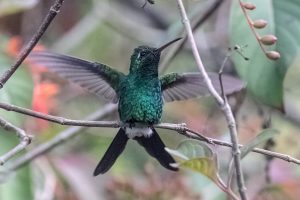
Why Hummingbirds Need Their Beauty Sleep
Or maybe "Energy Sleep" is a befitting term as to why they sleep.
Hummingbirds are in a constant hustle to sustain their astoundingly speedy wings, second only to those of the Manakin bird. Their diet consists mainly of nectar and insects. Moreso, they eat more than three times their body weight to survive the day.
All those fats and essential proteins, not to bulk up, but to survive the night.
To put it clearly, when hummers aren't expelling energy to eat while awake, they burn it making heat asleep. See, they don't have fur or a blanket to cover up, so they get that life-or-death warmth themselves. And it demands a lot of energy.
So much that sometimes, they enter a deeper state of sleep called "nocturnal torpor," all in a bid to save some energy.
Explaining The Hummingbird Torpor
It illustrates how these little birds survive out on cold winter nights without a fur or blanket for warmth. It's an extraordinary body state.
In torpor, the hummer shuts down its whole system to stop generating heat, which would zap some energy. It doesn't puff up or anything like that. It's literally dead. You can hold the bird in your hand, and it'd be stiff as wood.
A torpid hummer stays in the zone for about 20 minutes to an hour before returning to life.
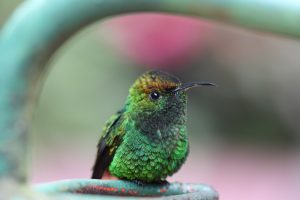
How Long Do Hummingbirds Sleep
It's safe to say the hummers sleep till sunset. But they really are just waiting till its daybreak before they start what seems to be a daily feast.
Right after recovering from torpor, they can eat as much as a fourth of their daily intake.
In Unique Cases
Hummingbirds would feed late into the night to satisfy their unsatisfying appetite. But only with the help of a reflective porch or yard lighting shone at the hummingbird feeder.
And During Migration
Hummingbirds take on migration journeys of over hundreds or thousands of miles every year. It takes a lot of energy to complete, so they typically fly all through the day and rest at night.
If they have to cross an ocean or large water body, where there's no place to rest their claws, they can travel for hours until they reach their destination.
Wonder how these little birds have such endurance?
They overeat in preparation for the journey across borders, almost doubling their weight.
The Ruby-Throated Hummingbird, for instance, flies for over 20 hours non-stop from Texas to cross the Gulf of Mexico.
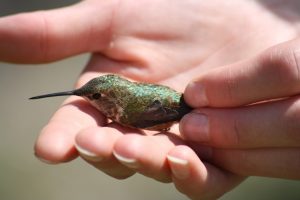
A Little More On How Hummingbirds Sleep
Do Hummingbirds Ever Stop Flying?
It's easy to think the strong nibble wings work clockwork. But they get a handy amount of rest at day and at night.
Catch a glimpse of a hummer who napped if off mid-day, and felt too welcome at the feeder he slept upside down.
A mate had to wake it from sleeping where it eats.
Look at this lovely image by Mary Reid from The Virginian Pilot right there on that link so you'd see what I'm talking about. 😉
Do Hummingbirds Hang Upside Down To Sleep?
While hummers can go into torpor mode at any time of the day to save energy, this leaves them unconscious for a while and helpless to even food.
You won't get a billboard place expecting such a show from the hummers.
How Do Hummingbirds Sleep During The Day?
Or do they?
Yes, you can catch hummingbirds coasting it off on a fine afternoon after a bellyful. A bird's got to catch some rest. But you won't find them really dozing it off until after dark.
At this time, most hummingbirds seep in and out of torpor to make it to the next morning. But, now and then, you can catch a hummer dozing it off in this state during the day. It takes a risk for about half an hour or more against slim odds.
Let’s see how they sleep in this video:
What Do Hummingbirds Do At Night Time?
As you'd already know, they need to switch off their internal system to survive on most nights. They enter a state of controlled hypothermia in the process, losing any connection they have to external stimuli during this period.
Hummingbirds survive cold winter nights with this routine, keeping a few species at bird feeders all year-round.
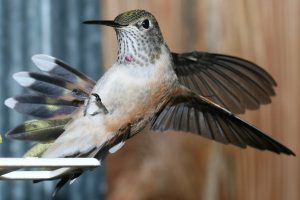
Final Thoughts
Hopefully, this is everything you need to know about how hummingbirds sleep.
Now you know that unlike us, they don't always sleep to catch a day's rest but to take a lamentable pause from food.
Have you encountered a sleeping hummingbird or a zoned-out hummer in torpor before?
Share strange encounters you have had with them, and I'd be happy to help.

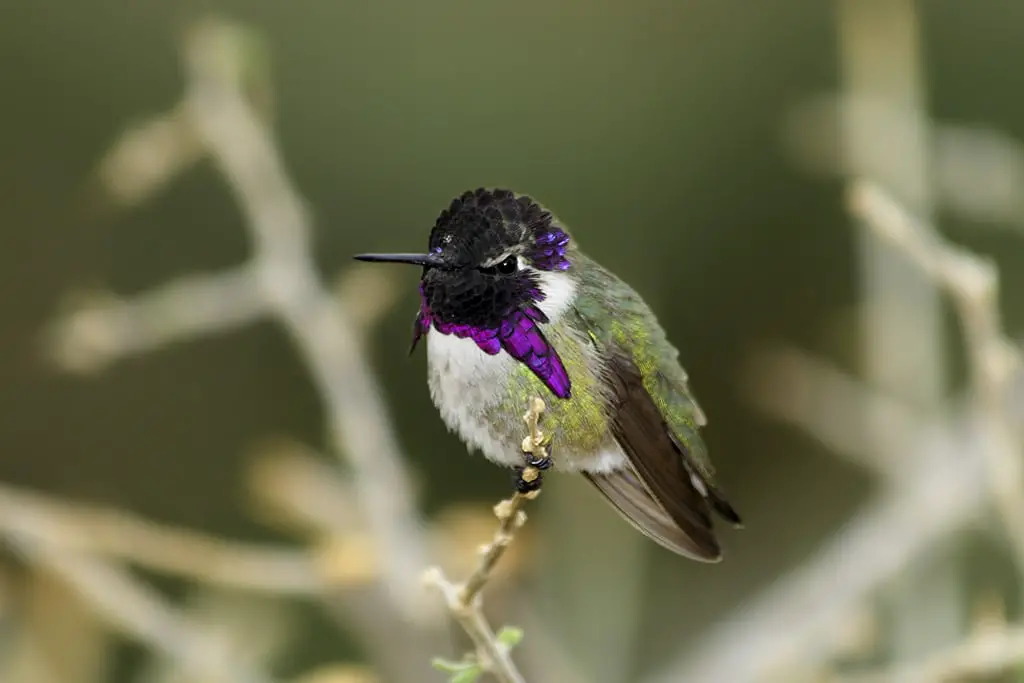
Last night, around 10 PM, I saw a hummingbird perched on a hibiscus plant next to my feeder. I assumed it was sleeping and in torpor (the outdoor temp. was about 50-55 degrees F), but when I was about 3 feet away, he started "pulsating" his body up and down (his beak was pointed upward). I immediately left as I did not want to disturb it any longer. Do hummingbirds wake up at night if they sense an animal/person nearby?
I need to mention that I did approach the bird earlier when it got dark outside. He was perched on the feeder with his bill pointed up. There is a light near the feeder. He "pulsated" when I got close, so I walked away.